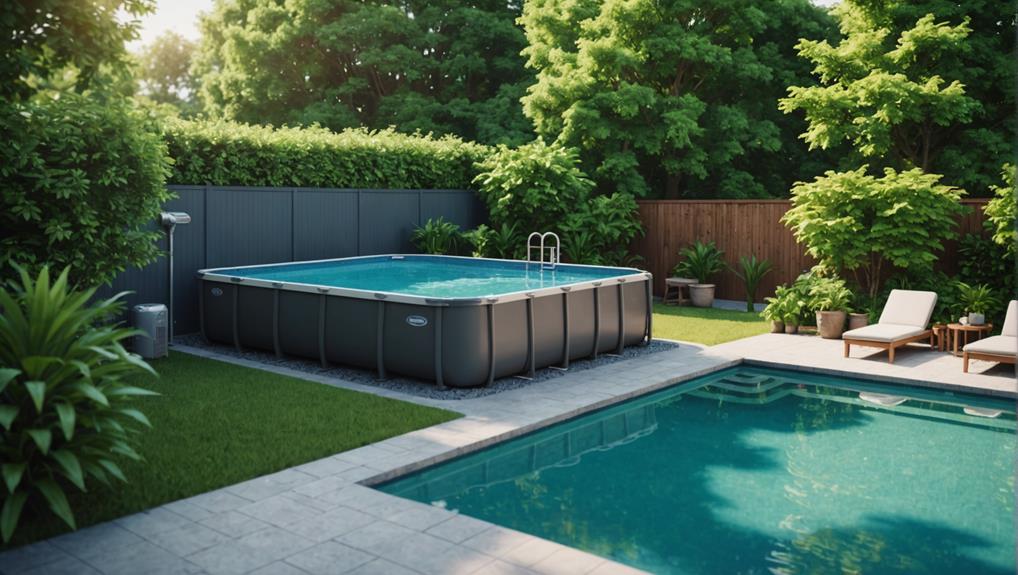You're considering a heat pump for your above ground pool, and rightly so. Heat pumps offer an unbeatable combination of efficiency, reliability, and eco-friendliness. With a Coefficient of Performance (COP) of up to 5:1, they're the most cost-effective option. To get it right, you'll need to select the right model, considering factors like pool size, desired temperature, and climate. Accurate sizing is vital, and you'll need to calculate the pool's heat loss to determine the required heating capacity. By choosing the right heat pump and following proper installation and maintenance guidelines, you'll be on your way to enjoying a warm and inviting pool all season long – and there's more to explore to get the most out of your investment.
Key Takeaways
- Heat pumps are the most cost-effective and eco-friendly option for heating above ground pools, with a Coefficient of Performance (COP) of up to 5:1.
- Selecting the right heat pump model depends on pool size, desired temperature, and climate, with factors like flow rate and COP affecting performance.
- Accurate pool sizing is crucial to ensure the heat pump operates efficiently, considering factors like pool size, shape, and temperature to calculate the required BTU rating.
- Proper installation and connections are vital, including a dedicated electrical hook-up, sufficient clearance, and correct pipe sizing to reduce running costs and ensure peak efficiency.
- Regular maintenance and care, such as cleaning the pool filter and inspecting the heat pump, are essential to extend the system's lifespan and reduce energy consumption.
Heat Pump Benefits and Features
When it comes to heating your above ground pool, heat pumps stand out as the clear winner, offering an unparalleled combination of efficiency, reliability, and eco-friendliness that sets them apart from traditional electric heaters.
One of the most significant heat pump benefits is their exceptional Coefficient of Performance (COP), which can reach up to 5:1. This means that for every 1kw of electricity used, you can generate 5kw of heat, making them the most cost-effective option for heating your above ground pool.
As a swimming pool heat pump user, you'll appreciate the ability to heat your pool water up to 40°C, while also having the flexibility to cool it down in hot weather. With a heat pump model like the Hot Splash, designed specifically for small above ground pools, you can enjoy an efficient and cost-effective solution.
Additionally, heat pumps collect free heat from the air and transfer it to the pool water, making them a reliable and environmentally friendly option for heating a swimming pool.
Choosing the Right Heat Pump
To guarantee you get the most out of your heat pump, it is vital to select the right model for your above ground pool, considering factors such as pool size, desired temperature, and climate.
When choosing a heat pump, you should consider the pool's volume, air temperature, and desired heat output. For instance, the Hot Splash heat pump is designed for small above ground pools with a water volume of up to 10m3 and provides a heat output of 9.5kw.
Heat pumps feature a coefficient of performance (COP) that measures their efficiency. Look for heat pumps with a high COP, such as the Thermotec Eco Inverter 9kw heat pump, which has a COP of 5.5.
Additionally, consider the flow rate, which affects the heat pump's performance. The Thermotec Eco Inverter has a flow rate of 10-20m3/h. Heat pumps with inverter technology, like the Thermotec Eco Inverter, provide efficient heating and cooling, quiet operation, and low energy consumption.
Sizing Your Above Ground Pool
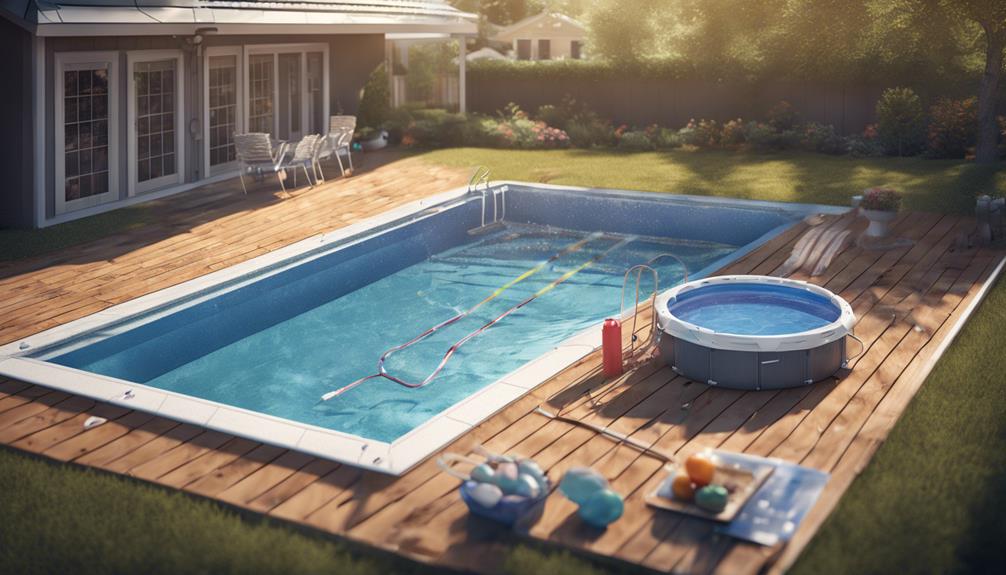
Sizing your above ground pool accurately is crucial to guarantee the heat pump operates efficiently and effectively.
You'll need to calculate the pool's heat loss to determine the required heating capacity. Factors influencing heat loss include pool size, shape, and temperature, as well as ambient air temperature and wind speed.
Consider the desired temperature range for your pool, typically between 78°F and 82°F (25°C and 28°C).
To calculate the required BTU (British Thermal Units) rating, you'll need to know your pool's volume, surface area, and desired temperature increase.
A general rule of thumb is to provide 10-15 BTU per square foot of pool surface area.
For example, a 12,000-gallon pool with a surface area of 300 square feet would require a heat pump with a minimum of 30,000-45,000 BTU.
Selecting a heat pump that matches your pool's specific needs is imperative to guarantee efficient heating and extend the swimming season.
Proper sizing will also help reduce energy costs and prolong the lifespan of your swimming pool heater.
Heat Pump Installation Essentials
When installing a heat pump for your above ground pool, you'll need to guarantee it's placed on a level platform to reduce noise and vibration, and that it's positioned outdoors with sufficient clearance for peak airflow.
You'll also need to ponder the electrical hook-up, which requires a dedicated breaker and sufficient power to support the heat pump's running and startup currents.
Level Platform Requirements
A sturdy, level platform is necessary to guarantee your heat pump operates safely and efficiently.
A level platform is vital for above ground pool heat pumps, as it guarantees proper airflow and prevents damage to the unit. When selecting a platform, consider the weight of the heat pump, as well as the surrounding environment. Avoid placing the platform near any obstacles that could obstruct airflow or interfere with the evaporator coil.
For outdoor pools, selecting a platform that can withstand harsh weather conditions and air temperature fluctuations is imperative. A durable, rust-resistant material such as concrete or metal is ideal.
Additionally, verify the platform is large enough to accommodate the heat pump's footprint, including the titanium heat exchangers. A well-designed platform will also help reduce running costs by allowing the heat pump to operate at peak efficiency.
Electrical Hook-Up Essentials
Installing a heat pump for your above ground pool requires careful attention to electrical hook-up essentials to guarantee safe and efficient operation.
You'll need a dedicated 50 or 60 amp breaker and 240 volts to support the heat pump's power requirements.
It's vital to hire a qualified electrician to perform the electrical hook-up, as they'll verify the installation meets local electrical codes and regulations.
The electrical supply must be able to support the running and startup currents stated on the heat pump's listing, and a dedicated cable should be run back to the electrical consumer unit.
A type D circuit breaker is typically recommended, and a soft-start option may be necessary for large single-phase heat pumps with sensitive electrical supplies.
Your electrician will calculate the required cable size and verify the installation meets the manufacturer's instructions and recommendations for electrical hook-up.
Electrical and Plumbing Connections
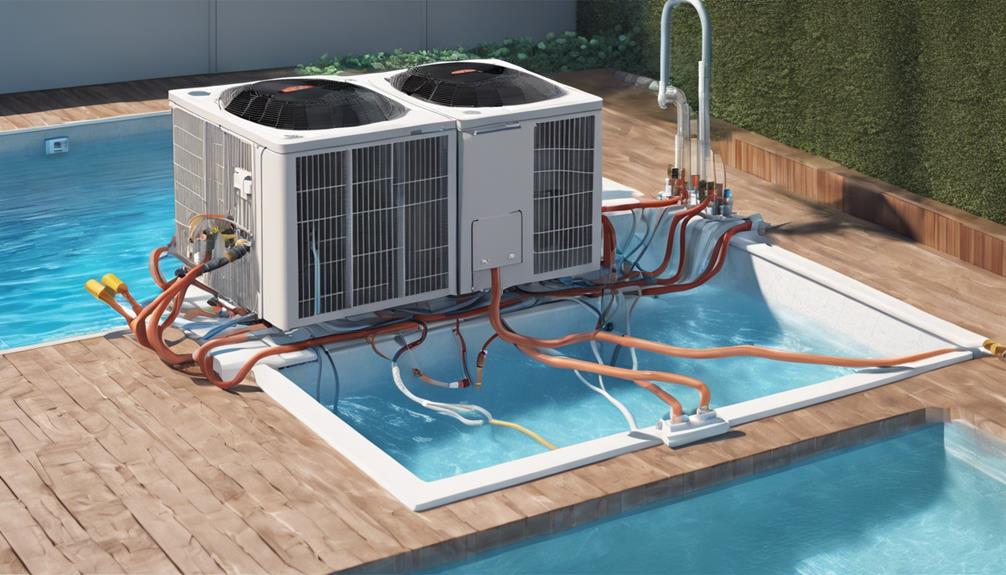
To guarantee safe and efficient operation, the heat pump's electrical and plumbing connections must be carefully planned and executed, taking into account the specific requirements of your above-ground pool setup.
Certify the electrical supply can support the running and startup currents of the heat pump, with a dedicated breaker, typically a type D circuit breaker, installed by a qualified electrician. The electrician will calculate the correct cable size required for the dedicated cable run back to the electrical consumer unit.
Next, check the pipe size, commonly 1.5' or 2' in the UK, or 50mm in Europe, and use correct size connectors and elbows to match.
For rapid pool heat-up, you can install the heat pump in line with an existing boiler, but a bypass arrangement is recommended to isolate the heat pump and adjust the water flow rate.
Finally, don't forget to insulate pipes to and from the heat pump to reduce heat loss, aiming for a 1-2 degree difference between water in and out temperatures.
Regular Maintenance and Care
When it comes to ensuring your heat pump for above ground pools operates efficiently and effectively, you'll need to prioritize regular maintenance and care.
By staying on top of routine tasks, you'll prevent issues, reduce energy bills, and extend the system's lifespan.
To get started, you'll want to focus on cleaning your pool filter, inspecting your heat pump, and winterizing the system when the seasons change.
Pool Filter Cleaning
You'll need to prioritize regular pool filter cleaning as a critical component of your heat pump's overall maintenance and care routine. This is vital to guarantee proper heat pump operation, maintain adequate water flow, and prevent increased energy bills.
Regular backwashing of the pool filter is essential, with a recommended frequency of every 1-2 weeks depending on pool usage.
Failing to clean the filter regularly can lead to reduced heat pump efficiency, increased energy bills, and even system failure.
A dirty filter can increase the pressure gauge reading by 10-15 psi, causing the heat pump to work harder and leading to increased energy consumption and wear on the system.
Cleaning the filter also involves checking and replacing the filter cartridges or grids as recommended by the manufacturer, typically every 1-3 years depending on pool conditions.
Heat Pump Inspection
Regular heat pump inspections are crucial to identifying potential issues before they become major problems, and it's essential that you perform these checks at least every three months during the swimming season.
As you inspect your heat pump, look for signs of wear and tear on the pump's casing, fan, and compressor. Check the refrigerant lines for leaks or damage, and confirm all electrical connections are secure.
Verify that the air intake and outlet vents are clear of debris, allowing for proper airflow. Next, inspect the water heater's temperature sensor and confirm it's clean and free of mineral buildup.
Check the pool water's pH and alkalinity levels, as improper balances can affect the heat pump's performance.
Finally, review your heat pump's installation manual to confirm you're following the manufacturer's recommended maintenance schedule.
Winterizing the System
As you prepare your heat pump for the off-season, it's imperative to winterize the system to protect it from freezing temperatures and guarantee it remains in good working condition when you're ready to fire it up again.
Winterization is a vital part of heat pump maintenance, and doing it correctly is paramount to prevent damage and corrosion.
Drain and disconnect the heat pump from the pool plumbing to prevent damage from freezing temperatures.
Inspect the refrigerant lines and connections for signs of damage or wear, and tighten any loose fittings to prevent refrigerant leaks.
Apply a silicone-based lubricant to all electrical components and terminals to protect them from moisture and corrosion.
Cover the unit with a waterproof cover to shield it from the elements.
Heat Pump Accessories and Parts
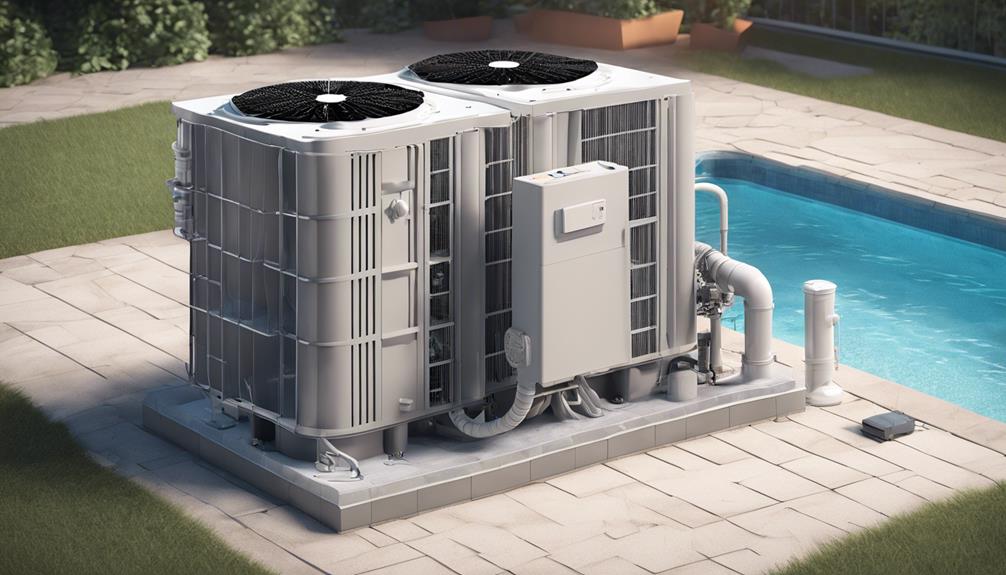
Heat pump accessories and parts play a pivotal role in optimizing the performance and efficiency of your above ground pool's heating system.
When selecting a heat pump for your swimming pool, paramount importance should be given to the heat pump accessories and parts that come with it. Heat pumps supplied with the right accessories can markedly enhance their performance.
For instance, heat pumps require a proper installation kit to guarantee a secure and efficient connection to your pool. Different pool heat pump models come with varying accessories, so pivotal is the need to choose a heat pump that provides the necessary components for your specific pool setup.
Heat pumps work by extracting heat from the outside air and transferring it to your pool water, and the right accessories can improve this process. Pumps provide better circulation, and heat pump accessories like sensors and controllers help regulate the temperature.
Troubleshooting Common Issues
When operating your above ground pool's heat pump, you'll likely encounter some common issues that require troubleshooting to guarantee peak performance and efficiency.
To certify your heat pump runs smoothly, verifying prompt identification and address of common problems is crucial.
Inadequate airflow or clearance
Certify your heat pump has sufficient clearance from surrounding objects and that airflow isn't obstructed, as this can lead to reduced performance and increased energy consumption.
Incorrect water flow rates
Verify that your heat pump's water flow rate matches the manufacturer's specifications, as low flow rates can decrease efficiency.
Dirty air filter
Regularly clean the air filter to prevent reduced efficiency and increased energy costs.
Thermostat or sensor issues
Check and calibrate your heat pump's thermostat and sensor regularly to ensure consistent pool temperatures.
Heat Pump Warranty and Support
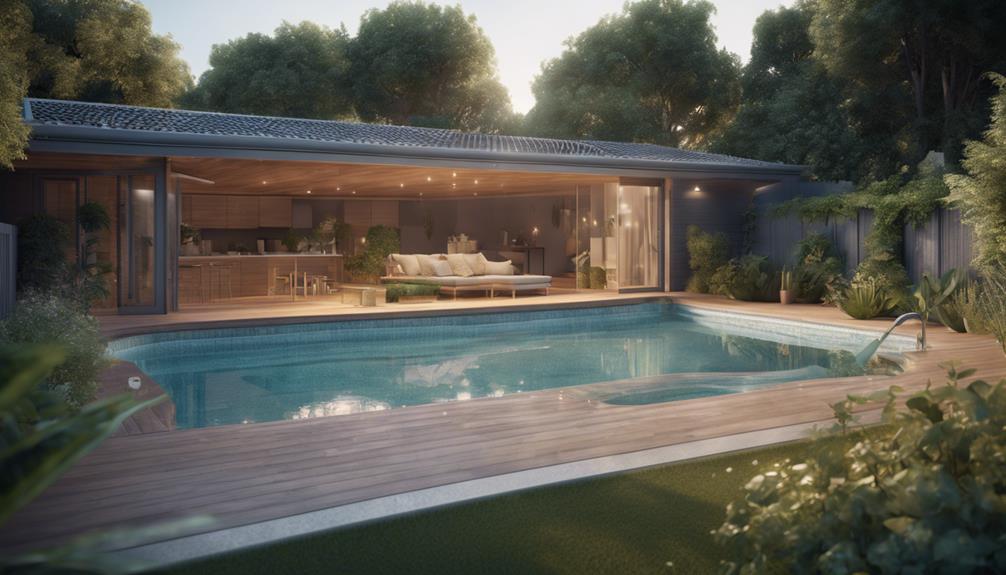
Buying a heat pump for your above ground pool is a significant investment, and understanding the warranty and support options available can provide peace of mind and protect your purchase.
With HeatPumps4Pools, you can expect warranties ranging from 2 to 5 years, depending on the model and manufacturer. Before you even make a purchase, you'll have access to free technical support and advice, including expert guidance on pool heater sizing to guarantee you get the right product for your needs.
If you ever need spare parts or repairs, you can rely on HeatPumps4Pools' network of over 150 engineers across the UK to assist on-site.
Additionally, the company offers installation and servicing of heat pumps throughout the UK, as well as design and installation services for dehumidifiers, pool heaters, and ducting for indoor pools.
But don't just take their word for it – customer reviews rave about the company's excellent after-sales support, with customers praising the helpful and friendly customer service team and prompt issue resolution.
With HeatPumps4Pools, you can trust that you're in good hands.
Frequently Asked Questions
Do Heat Pumps Work on Above Ground Pools?
You'll be glad to know that heat pumps can efficiently heat your above ground pool, offering impressive energy savings and cost benefits through optimized water circulation, heat distribution, and pump power, tailored to your pool's size and seasonal usage.
What Size Heat Pump Do I Need for an Above Ground Pool?
'To determine the right heat pump size for your above ground pool, you'll need to ponder pool capacity, heat output, pump efficiency, energy costs, pool size, heat loss, pump type, installation requirements, and climate considerations to guarantee ideal system design.'
At What Temperature Does a Pool Heat Pump Become Inefficient?
You're traversing the heat pump landscape like a captain charting treacherous waters. A pool heat pump becomes inefficient when the ambient temperature drops below 50°F, like a ship losing steam, causing pump performance to plummet, energy consumption to soar, and heat loss rates to skyrocket.
What Is the Best Option for Heating Above Ground Pool?
When choosing the best option for heating your above ground pool, you should prioritize pool heating systems that balance energy efficiency, cost effectiveness, and comfort level, considering factors like water circulation, sun absorption, insulation importance, and climate consideration for ideal system integration.
Conclusion
You've made it to the end of this exhaustive guide to heat pumps for above ground pools.
As you've seen, heat pumps can be a cost-effective and eco-friendly way to extend your swimming season.
But did you know that using a heat pump can also increase your pool's lifespan by reducing the corrosion caused by rapid temperature changes?
It's true – and with the right heat pump and proper maintenance, you can enjoy a warm and comfortable pool experience for years to come.

I’m Max, the founder and chief pool enthusiast behind Pool Pro Tips. As a passionate pool owner and cleaning expert, I created this website to share my knowledge and experience with you, helping you to keep your pool sparkling clean and safe for years to come.

